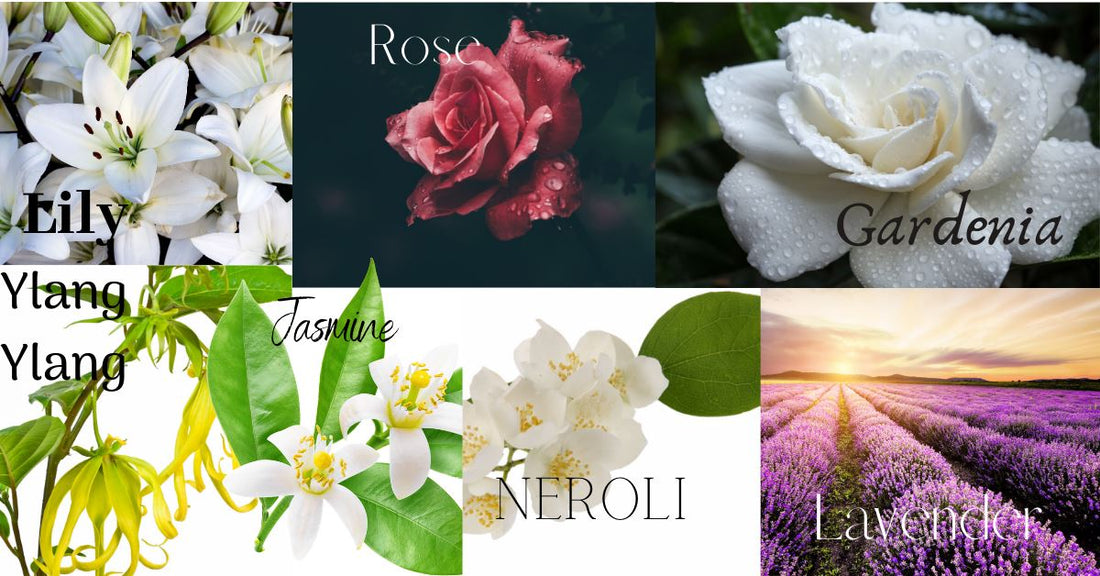
We love our flowers! The wonderful scents, pleasing aesthetics. Flowers can change a bad day to a good day just by their presence. But the power of flowers goes so much deeper. Here are some facts that you may not have known about some of your favorite flowers.
Lavender. Botanical name Lavandula angustifolia, Has an earthy floral scent to it. Lavender has shown results in treating anxiety, fungal infections, hair loss, and wounds. It is also known to help with sleep by relaxing muscles and calming the heart rate, which promotes a deeper and more consistent sleep. This oil is one of the most popular essential oils due to its many health benefits. The use of Lavender can be dated over 2000 years.
Rose. Botanical name Rosaceae, Has a sweet, fruity, violet, clove smell to it. Rose boasts a complex array of vitamins, minerals, and antioxidants. Rose has excellent emollient properties for moisturizing dry skin; it also offers antiseptic and astringent properties to treat acneic skin, as well as anti-inflammatory properties that help treat redness and inflammation. Rose essential oils are widely used all over the world for its health benefits.
Jasmine. Botanical name Jasminum officinale, Has a sweet, rich fragrance to it. Jasmine has a pleasing and uplifting effect on the mind and it actively fights depression. It’s scent is believed to help your brain release hormones, including serotonin which helps to improve ones mood as well as gives an energy boost. Jasmine also has natural antiseptic and antibacterial properties
Lily. Botanical name Lilium auratum, Has a sweet aroma to it. Lily Rich in Vitamin A/C/E, anti-oxidant and minerals, as ideal natural moisturizer for body, skin and hair. It soothes skin disorders like acne, rashes, eczema, wrinkles, psoriasis, dermatitis, sores, burns, insect bites, stretch marks
Gardenia. Botanical name Jasminoides, Has a sweet, floral smell to it. Gardenia exhibits anti-inflammatory properties. It is an effective remedy for treating inflammatory disorders like arthritis, ulcerative colitis, and intestinal inflammation. Geniposide and genipin are two special chemicals in gardenia that promise anti-inflammatory actions
Neroli. Botanical name Citrus Auratium, Has a sweet, citrus, honeyed floral smell to it. Neroli essential oils are known to rejuvenate skin. When applied to skin, it provides an intense moisturizer which boosts the skins regenerating process. Neroli also helps to combat acne, helps with stress and sleep.
Ylang Ylang. Botanical name Cananga odorata, has a heavy, sweet, fruity floral smell to it. Ylang Ylang makes a very effective skin cleanser due to its potent anti-bacterial properties. This mega oil is also used as an anti aging oil as its antioxidant properties combat free radicals that contribute to premature aging. It also acts as a healing powerhouse, boosting the regenerative process of the epidermis.
Chamomile. Botanical name Matricaria chamomilla, Has a fresh, sweet, fruity, herbaceous smell to it. Chamomile can help with anxiety, promotes sleep and wound healing including ulcers and sores, eases skin conditions like eczema or rashes, and it also helps with anti-inflammation and pain relief, for example back pain.
Frequently asked questions
Can certain flowers repel bugs and animals? Yes, here are a few. Marigolds repels plant plant lice, mosquitoes and rabbits. Chrysanthemums repel ants, Japanese beetles, roaches, bedbugs, silverfish and ticks. Lavender repels gnats, mosquitoes and mice. Petunias repel asparagus beetles, leaf hoppers, aphids and tomato worms. Daffodils repel gophers, deer, squirrels, rodents and rabbits.
How do I make my cut flowers last longer? Cut the end of the flowers every couple of days. Keep the water level in the vase as high as you can. Pick out the dead petals and leaves and keep the flowers out of direct sunlight or heat.
When do flowers come into season? Flowers come into season around spring time from March – May.
How many days does it take for a flower to grow? It can take anywhere from 60-90 days.

